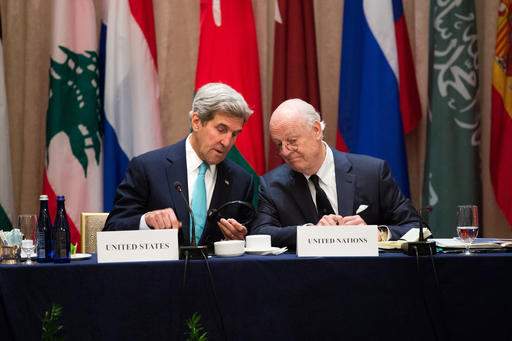-
Tips for becoming a good boxer - November 6, 2020
-
7 expert tips for making your hens night a memorable one - November 6, 2020
-
5 reasons to host your Christmas party on a cruise boat - November 6, 2020
-
What to do when you’re charged with a crime - November 6, 2020
-
Should you get one or multiple dogs? Here’s all you need to know - November 3, 2020
-
A Guide: How to Build Your Very Own Magic Mirror - February 14, 2019
-
Our Top Inspirational Baseball Stars - November 24, 2018
-
Five Tech Tools That Will Help You Turn Your Blog into a Business - November 24, 2018
-
How to Indulge on Vacation without Expanding Your Waist - November 9, 2018
-
5 Strategies for Businesses to Appeal to Today’s Increasingly Mobile-Crazed Customers - November 9, 2018
Syria truce weakened by new airstrikes
The US strike was “an extraordinary display of American heavy-handedness”, Russia’s ambassador to the UN, Vitaly Churkin, said Saturday.
Advertisement
At a UN meeting on migrants, Kerry said the nations gathered had reaffirmed the right that impartial aid workers should be granted unfettered access to deliver emergency assistance to civilians. “While we have seen comments attributed to the Syrian military, our arrangement is with Russian Federation, which is responsible for the Syrian regime’s compliance, so we expect Russian Federation to clarify their position”.
United Nations aid chief Stephen O’Brien said he was “deeply concerned” by the incident and called on “all parties to the conflict, once again, to take all necessary measures to protect humanitarian actors, civilians, and civilian infrastructure as required by global humanitarian law”.
A Red Crescent warehouse was also hit and a Red Crescent health clinic was reported to be seriously damaged, he said. The government blamed some of the violence on what it said was an insurgent assault, but another rebel official denied they had yet launched new attacks. He stressed that all parties received notification of the convoy, which was carrying aid for about 78,000 people. Initial estimates indicated that at least 18 of the 31 trucks in the convoy were hit.
The Syrian Civil Defense, the volunteer first responder group also known as the White Helmets, confirmed that casualty figure.
They posted images of a number of vehicles on fire in the dead of the night.
The bloodiest day for civilians was Sunday, when a barrel bomb attack killed 10 in a southern rebel-held town and one woman died in the first raids on Aleppo since the truce started.
Earlier on Monday, Russia criticized the United States for not doing enough to rein in militants in Syria to protect the truce deal, saying continued violations of the ceasefire by militants made it “senseless” for Damascus to stick to the agreement.
The week-old cease-fire had brought a brief respite to at least some parts the war-torn country.
But while the agreement has led to a significant reduction in fighting over the past week, violence has been increasing in recent days, and a planned delivery of humanitarian aid to besieged rebel-held districts of eastern Aleppo – one of the first steps in the deal – has been repeatedly postponed.
As many as 275,000 people remain trapped in Aleppo’s battleground, without food, water or medical care, Stephen O’Brien, the United Nations undersecretary general for humanitarian affairs, said.
Russia’s defence ministry appeared to bury the truce, saying rebel violations made it “pointless” for government troops to uphold it.
The cease-fire came into effect on September 12.
Asked about the Syrian declaration that the ceasefire was over, Kerry said, “We have not had seven days of calm and of delivery of humanitarian goods”.
Under the US-Russia agreement, fighting was to have halted across Syria and humanitarian aid would reach civilians suffering increasingly dire humanitarian conditions.
Rebel forces and activists say government planes have bombed areas that are under the truce agreement, including rebel-held parts of Aleppo.
Some Syrian rebel groups also expressed pessimism about the ceasefire. There were no independent reports of deaths of civilians on the government-side since the ceasefire came into effect. The road must become a demilitarized zone for aid to be transported along it, meaning both Syrian government troops and the rebels have to pull back.
The US secretary of state, John Kerry, said US and Russian teams were meeting in Geneva to assess the situation, adding that the ceasefire process was continuing.
“I believe that, practically, it has failed and has ended”, said Zakaria Malahifji, head of the political office of the Aleppo-based group Fastaqim, adding that it remained to be seen if anything could be done “in theory” to save it.
The Syrian army said in a statement last week that the truce will last until midnight Sunday. Damascus refers to all armed opposition groups as terrorists.
The cease-fire applied to all armed groups in Syria, with the exception of the Daesh terrorist group and the Nusra Front, which recently changed its name to the Fateh al-Sham Front.
Secretary of State John Kerry says the week-old truce in Syria brokered by the US and Russian Federation is “holding but fragile” despite persistent violence and a lack of aid deliveries to besieged communities.
Syrian president Bashar al-Assad has announced the ending of the country’s fragile ceasefire blaming rebel groups for undermining the truce.
Syria’s armed forces “exercised the highest degree of self-restraint while facing violations by terrorist groups”, the statement said.
However, Syria’s military command declared the US-Russian-brokered truce at an end.
Anas Abdah, the head of the opposition Syrian National Coalition, said ultimately Russian Federation was responsible for the truce’s failure.
Advertisement
The ceasefire is the second negotiated by Washington and Moscow since Russian Federation joined the war.





























